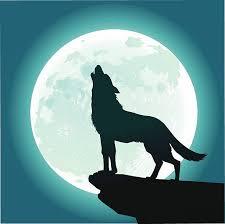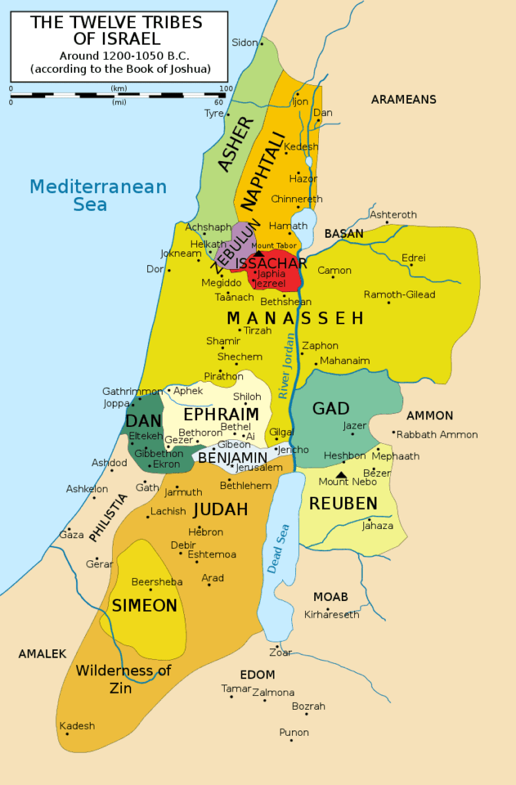The Tribe of Benjamin
26: 38-41
The tribe of Benjamin DIG: What does the Second Census tell us about Benjamin’s historical roots? Why did the tribe of Benjamin increase so greatly from the First Census? Why would the wilderness generation want to know they had common historical roots from their parents, but a completely separate identity.
REFLECT: What meaningful group are you a member of? How does being a part of that group help to support you and make you grow spiritually? How does being a part of it enable you to help others? What can you do to make sure that the positive parts of your past are accentuated in your relationship with God?
Benjamin is a ravenous wolf.

1. The First Census in the past found the tribe of Benjamin being numbered at 35,400 (to see link click Ak – Numbering the Tribes). The banner of the tribe of Benjamin has a wolf on it, to indicate the warlike nature of the tribe. On his deathbed, Jacob prophesied: Benjamin is a ravenous wolf (Genesis 49:27a). The word ravenous comes from the Hebrew tref or trefah, meaning a wolf that tears apart his prey. Sometimes tref is used in a generic sense. For example, there is kosher food, and anything else is treff. But the word trefah actually comes from the Hebrew word meaning to tear. In the Torah, if an animal, even a kosher animal, is torn apart and killed, it is trefah. In other words, there is no such thing as kosher road-kill even if it’s a nice prime rib. It would not be prepared in a way that the Torah commands (Leviticus 11:1-46; 17:1-16), with the core thought being: Be sure you do not eat the blood, because the blood is the life, and you must not eat the life with the meat (Deuteronomy 12:23). That’s why hunting is not normally a Jewish thing. When someone shoots their prey, it is torn apart and automatically becomes unkosher. In the TaNaKh, Jews would set a snare for a kosher animal and capture it. Then they could kill in the ritual way, by draining the blood.
Therefore, Benjamin is a wolf who tears apart, and there are some very interesting people from the tribe of Benjamin who fulfilled Jacob’s prophecy. One is Ehud, a famous warrior and one of the judges (Judges 3:15-30). Sha’ul the first king of Isra’el was also a Benjamite (First Samuel 9:1-2), and for better or worse, fulfilled this prophecy of Jacob. Saul’s son Jonathan, a great warrior, became one spirit with David (First Samuel 18:1). In addition, both Mordecai and Esther were from the tribe of Benjamin (Esther 2:5-7). They were warriors of that generation whom ADONAI used to deliver Isra’el from her enemies like a ravenous wolf (see Esther Bm – The Jews Struck Down All Their Enemies with the Sword, Killing and Destroying Them).
The warlike nature of the small tribe of Binyamin became well known, as exhibited in their swordsmen. This tribe was so aggressive and successful that they would be able to share their plunder with the other tribes. This seems like a strange prophecy for a son whom Jacob especially loved, but it was both a promise and a warning. The tribe of Benjamin would be courageous and strong, successful in warfare, but at the same time it might become cruel and ravenous.
So, it seems that Benjamin’s tribe had its dark side. The warlike nature came out not only in defense of his country, but also in depravity within his country. In Judges 19–21 Benjamin took up an offense against the other eleven tribes of Isra’el, and civil war ensued. This period had the reputation of everyone doing what was right in his own eyes (Judges 21:25). What led to this was the horrific abuse and death of an unnamed Levite’s concubine (Judges 19:10-28). The eleven tribes turned against the tribe of Benjamin and nearly annihilated them because of their refusal to give up the perpetrators (Judges 20:1 to 21:25).593 Thank God they were not destroyed, otherwise we would not have had Mordecai (see the commentary on Esther Bh – The King Gave His Signet Ring to Mordecai), or Paul. Eventually they all restored Benjamin’s tribe, greatly diminished due to the war, and the country reunited.
In the morning he devours the prey, in the evening he divides the plunder (49:27b). Both attributes, devouring the prey and dividing the plunder, were later evident in the tribe. Although the smallest of the tribes, in the near historical future, they would become famous for their courage, fierceness and power. After the conquest of Canaan, they received the territory between the tribes of Ephraim and Judah. It has been a war-zone throughout Israel’s history. The tribe of Benjamin themselves became known as a warrior tribe (Judges 5:14, 20:14-21; 2 Samuel 2; First Chronicles 8:40 and 12; 2 Chronicles 14:8, 17:7; Psalm 68:27).

2. The Second Census in the present: The descendants of Benjamin by their five clans were: of Bela, the Belaite clan; through Ashbel, the Ashbelite clan; through Ahiram, the Ahiramite clan; through Shupham, the Shuphamite clan; and through Hupham, the Huphamite clan. Moses goes back to the first son, Bela, and describes the two sub-clans of Ard and Na‘aman; through Ard, the Ardite clan; and through Na‘aman, the Na‘amanite clan. These were the clans of Benjamin, by their families; those numbered were 45,600 (26:38-41), a considerable increase of 10,200 from the First Census (see Ai – The First Census: The Old Generation of Rebellion), or 29 percent, the second largest increase of all the tribes. Although the Benjamites were very courageous, that was not where their safety lay. The prophecy of Moses shed some light on this. He prophesied: Let the beloved of the LORD rest secure in Him, for He shields him all day long, and the one ADONAI loves rests between His shoulders (Deut 33:12). This last phrase literally means he rests on the Lord’s back. This pictures a Father carrying His beloved on His back, and therefore a beautiful metaphor for God’s protective, fatherly care of Benjamin.594 The little tribe of Benjamin was situated next to Judah’s northern boundary, and the city of Jerusalem was on the northern border of Judah and the southern border of Benjamin. Since the Sanctuary would be in Jerusalem, Benjamin would be close to the LORD, who dwelt there with His people.595
Unlike the blessing in Genesis 49, which depicts Benjamin as a ravenous wolf, in Deuteronomy Moses pronounces a tender blessing on Benjamin – Jacob’s youngest son – one reminiscent of Benjamin’s close relationship with his father (Genesis 42:4 and 38, 44:18-34). For Benjamin, Moshe said: The beloved of ADONAI rests securely beside Him. He shields him all day long. Between His shoulders he rests. Benjamin can rest securely on the shoulders of YHVH who shields him from all threats. The anthropomorphism of resting between the shoulders of ADONAI brings to mind the figure of a father carrying his young son on his shoulders. Here, Moses rejoices that the tribe of Benjamin will dwell safely in peace among the people of God, no longer in conflict during the Messianic Kingdom (see the commentary on Isaiah Ge – Your Eyes Will See the King in His Beauty).596
3. The Messianic Kingdom in the future: The lists of names and numbers are the material and tangible signs of God’s blessing, God’s faithfulness to past promises, and the surety of God’s future promise keeping (see Ae – Stars of Heaven, Grains of Sand, and the Promises of God). In the far eschatological future, the tribe of Benjamin will have one portion of land in the Messianic Kingdom, extending from the east side to the west side (Ezekiel 48:23). When you look at Jacob’s family I think it would be fair to say that it was very dysfunctional, but even with all their problems, the sons of Isra’el believed in the God of Abraham, Isaac and Jacob, and all fourteen sons are found in the Messianic Kingdom (Ezeki’el 47:13, 48:1-29). Not one was lost. Yeshua talked about eternal security for those who believe, trust and have faith in Him. He said: My sheep hear My voice; I know them, and they follow Me. I give them eternal life, and they shall never perish; no one can snatch them out of My hand. My Father, who has given them to Me, is greater than all; no one can snatch them out of My Father’s hand; I and the Father are one (John 10:27-30).
Dear Heavenly Father, how fantastic you are, our always-loving, always-caring Holy Heavenly Father! What a beautiful picture of tender care that the Spirit of God painted of You when He inspired Moses to write the blessing for Benjamin, the one ADONAI loves rests between His shoulders (Deuteronomy 33:12), literally meaning he rests on the Lord’s back. It is a picture of great security when a young child is carried on their dad’s shoulders, resting on his back. The father is not only close by, but is right there holding on. The child does not even need to call out for help, for her dad is closer than even nearby, her dad is right there, holding onto her and protecting her.
What a wonderful comfort to be held close to You by Your mighty arms and to rest securely on Your shoulders! When problems and trials come, one thing that makes them harder is facing the problem all alone; but when daddy is near it brings such comfort. Problems seem so much easier to handle and much smaller when your children realize that an All-loving, Almighty Daddy is right there. When the focus is on the problem, then the problem seems big; but instead when Your child wisely focuses on your Almighty power, love and strength, then the problem becomes small. O God, You are my God, earnestly I seek You. My soul thirsts for You. My flesh longs for You in a dry and weary land, where there is no water (Psalms 63:1-2).
David focused on your great lovingkindness and that kept him from falling into the trap of pity. How very wise of David that even when his life was in danger, instead of focusing on the problem, David looked up to You and praised You! He focused his mind off of the hard and dangerous situation that he was in and lifted his heart to concentrate on how very Awesome and Wonderful You always are! Since Your lovingkindness is better than life, my lips will praise You. So I will bless You as long as I live. In Your name I lift up my hands (Psalms 63:3-4). Making time to praise You and to meditate on Your Word is like feasting on a rich meal. My soul is satisfied as with fat and oil, so my mouth praises You with joyful lips (Psalms 63:6). Thank You for carrying me (Isaiah 41:13, 46:4, 63:9). Praise You so very much for Your everlasting love that holds me tight in Your hands (John 10:27-30). I love to worship and to praise You! In Messiah Yeshua’s almighty Name and power of His resurrection. Amen



Leave A Comment